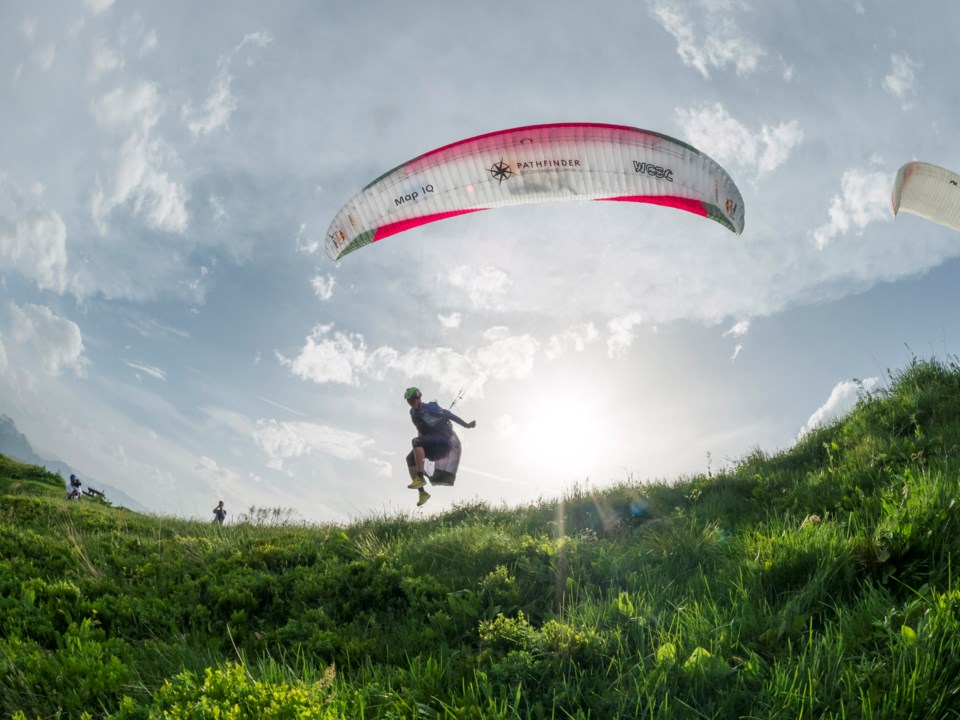James Elliott has boldly gone where no Canadian has ever gone before.
On June 22, the Pembertonian touched down at Zell am See in the Austrian Alps, completing a 1,223-kilometre journey in 11 days, seven hours, 30 minutes and 47 seconds. In so doing, he etched his name into history as the first hike-and-fly athlete from Canada ever to complete the legendary Red Bull X-Alps adventure race.
Elliott wound up 22nd out of 23 finishers and 32 total entrants.
“It was everything I thought it would be and a bit more,” he admitted. “I wasn’t sure, to be honest, whether or not I was going to finish. I was totally blown away.”
After optimal weather throughout the first five days of the event, conditions took a turn for the worse. Elliott found himself grounded at various inopportune points, losing out on precious chances to ride the strong midday thermals. One mistake led to another, enabling athletes whom Elliott had already passed to catch back up and supersede him.
“It became much more physical at that point, so it was about managing fatigue, it was trying to keep our spirits up as a team,” said the 40-year-old. “You’ve got to keep looking forward and putting one foot in front of the other—literally and figuratively.”
Pressing on in the face of inclement weather and the consequences of his own miscalculations, Elliott would not be denied. He glided, hiked and clawed his way westward around 15 Turnpoints scattered across five nations, spending time in Austria, Germany and Switzerland. Rounding Mont Blanc, he and his opponents then embarked on a return route across northern Italy.
On Elliott’s final day of competition, he made his way across the main chain of the Alps to reach Turnpoint Schmittenhöhe, teeing himself up for a short flight onto a floating platform in the middle of Lake Zell—his odyssey complete.
Reaching new heights
While Elliott has broken new ground for Canada, he also took part in an event that was itself historic. Generally speaking, only 15 to 20 per cent of any given field managed to make it through previous iterations of the X-Alps. That’s a far cry from the near-68-per-cent success rate seen this year.
The race has most definitely not gotten easier, but the athletes have become stronger and their gear more advanced.
“A lot of these teams are a lot more organized than they were even 10 years ago, and the equipment is becoming much lighter and higher-performance,” Elliott explained. “On the consumer side, we do have access to very highly detailed weather forecasting, which is really important for us to position ourselves in the right place at the right time.”
Swiss hike-and-fly maestro Chrigel Maurer leveraged every piece of intel and the best gear money can buy—along with his own wealth of experience and athletic ability—to conquer the race in a mind-boggling six days, six hours and a shade under two minutes. With many of those hours spent airborne, it was not only his career-best effort, but the fastest time in X-Alps history.
Maurer has now won eight straight editions of the biannual Red Bull epic, a feat that may never be replicated. However, 17 competitors finished within 24 hours of Switzerland’s champion, making this the closest X-Alps event on record.
A pair of Frenchmen, Damien Lacaze (six days, 18 hours and nearly six minutes) and Maxime Pinot (six days, 18 hours and 48 minutes) rounded out the podium.
Elisabeth Egger from Austria made history in her own right as the first woman to ever complete the race. She reached Zell am See in 21st place, taking 10 days, five hours and just over 18 minutes.
‘Freedom of flying’
Of course, Maurer, Egger and other Europeans enjoy a massive advantage over their opponents from elsewhere in the world. Paragliding is nearly as ubiquitous in Europe as skiing and mountain biking, though it remains niche in many other areas. Only one North American other than Elliott managed to finish: 20th-place contender Logan Walters of the United States.
Elliott aims to do his part in changing that.
“It’s really an honour to make a bit of history and be the first Canadian to cross the finish line in this race,” he said. “We face so many more challenges than your average European competitor. It’s logistically very challenging and expensive to get an entire team overseas—a lot of this comes at our personal expense.
“I hope that my success raises the profile of our sport in Canada and North America, and that more people will look at [paragliding] as an enjoyable pastime. Whether or not they compete, hopefully their eyes will be opened to see some of the benefits our sport can bring: just the absolute freedom of flying.”
Full results are available at redbullxalps.com/the-race/race-results-2023.




